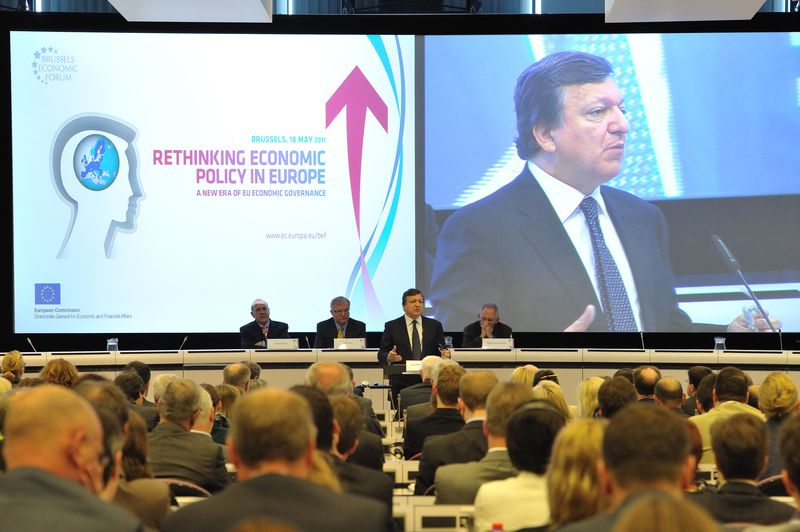Germany banged on the table: Less vacations, more work!
Ralitsa Kovacheva, May 20, 2011
 In perfect synchronous, but at two totally different scenes, German Chancellor Angela Merkel and her Finance Minister Wolfgang Schäuble criticised the countries of the southern periphery of the eurozone for working less but relaxing more. Both made clear that German solidarity was neither gratuitous nor infinite.
In perfect synchronous, but at two totally different scenes, German Chancellor Angela Merkel and her Finance Minister Wolfgang Schäuble criticised the countries of the southern periphery of the eurozone for working less but relaxing more. Both made clear that German solidarity was neither gratuitous nor infinite.
"We can't have a common currency where some get lots of vacation time and others very little,” Ms Merkel said at an event held by her party, the Christian Democratic Union. “People in countries like Greece, Spain and Portugal cannot retire earlier than in Germany,” she stressed, cited by Der Spiegel. The magazine reminded that last year Greece had announced reforms of its pension system, aimed at raising the average age of retirement to 63 and Germany had voted in 2007 to raise the retirement age from 65 to 67 over the next several years.
“We can't just show solidarity and then say that these countries can continue as before. Yes, Germany will help. But Germany only helps when the others exert themselves as well.”
Such an acute language by the usually restrained Ms Merkel is somewhat surprising. Of course, most comments were that her words were directed to the domestic audience in search of electoral support for the ongoing local elections in Germany, and in an effort to mobilise CDU's hesitant voters. There is surely such an element.
But it was hardly a coincidence that in the same vain spoke German Finance Minister Wolfgang Schäuble too, moreover to a very different audience - the  influential Brussels Economic Forum 2011. The message was clear - solidarity requires everyone to do his own job:
influential Brussels Economic Forum 2011. The message was clear - solidarity requires everyone to do his own job:
“Yes, recent events have shown that a common currency cannot survive without solidarity between its members. But such solidarity can only prevent an individual country’s crisis from turning into a eurozone crisis. A Member State has to be willing to deal with the root causes of its problems itself. The only workable course is for those countries in the eurozone who are somewhat weaker, to become stronger. We can help them, but we cannot do their job. Besides, one does not resolve one’s own problems of competitiveness by asking others to become less competitive and one cannot permanently close the gap between expenditure and income by asking others for more money.”
These words of Mr Schäuble sound especially critical against the background of the confessions of some influential European politicians that Greece does not fulfill its commitments under the economic programme agreed with the EU and the IMF in exchange for the loan of 110 billion euros. The president of the Eurogroup and Prime Minister of Luxembourg, Jean-Claude Juncker, has admitted that “Greece does not entirely respect the economic adjustment programme” and its budget deficit continued to aggravate, instead of diminishing. EU Economic and Monetary Affairs Commissioner Olli Rehn also abandoned his usual reserved tone, and called on the Greek political parties to show unity and support the measures in the programme in order to ensure public support for its implementation.
But the remarks made by Mr Schäuble were not intended only to the periphery of the eurozone. Apparently in response to the pressure from the populist parties that foster public outrage against the “rescue” of Greece, Ireland and Portugal, Wolfgang Schäuble defended the need for “buying them some time”, but stressed that “throwing other countries money at the problem is not the answer”:
“Greece’s debt crisis and the crises it generated offer a clear warning to European policymakers not to allow public debt to pile up indefinitely. It graphically demonstrated how markets can suddenly withdraw their support to governments when deficits and debt reach levels investors consider unsustainable. It would be grossly negligent of European policymakers to ignore these warnings, as markets would permanently lose confidence in eurozone countries’ ability to service their debts, leading to citizens losing their confidence. The financial, economic, social and political consequences of such a debt crisis would be dramatic and difficult to contain.”
The German finance minister repeatedly emphasized the need for reforms to boost economic growth and competitiveness in the EU. As you know, it was Germany that proposed the creation of the so-called Pact for Competitiveness, which has been adopted under the name Euro Plus Pact by 25 EU member states (including Bulgaria). In response to criticism that Germany must also make efforts regarding the excessive imbalances in the euro area by reducing its current account surplus, Schäuble said: “Yes, we have to avoid overly large imbalances between member States. But no, this cannot take the form of successful countries voluntarily limiting their competitiveness.”
The message is clear - Germany will not reduce its strength to compensate other’s weaknesses. Germany will not support an infinite pouring of money into the troubled economies. At the same time, Germany will not abandon the euro, nor will allow the weakening of the Economic and Monetary Union (EMU):
 “It is worth remembering that the European Monetary Union was not intended to be a quick fix for eurozone members or for that matter a get-rich scheme for financial speculators. It was not meant to be a system of redistribution from richer to poorer countries via cheaper borrowing for governments by means of common eurobonds or outright fiscal transfers. The European Monetary Union won’t succeed if a number of countries persistently run deficits and weaken their competitiveness at the expense of the euro’s stability.”
“It is worth remembering that the European Monetary Union was not intended to be a quick fix for eurozone members or for that matter a get-rich scheme for financial speculators. It was not meant to be a system of redistribution from richer to poorer countries via cheaper borrowing for governments by means of common eurobonds or outright fiscal transfers. The European Monetary Union won’t succeed if a number of countries persistently run deficits and weaken their competitiveness at the expense of the euro’s stability.”
Germany's position that the southern countries should work more and increase their competitiveness is not accepted by many analysts and economists. They argue that the statistics does not show people in these countries to be working less or that competitiveness has been decreased. They show the relevant figures and graphs that prove their arguments. I will not judge here who would win this dispute. But from Bulgaria's perspective things certainly look different than from Brussels's. I do not know how many holidays the Greeks have, but I can certainly say that just only last month Bulgarians had a total of 9 official holidays for Easter, St. George's day and May 24 (the Day of Slavic Alphabet and Culture).
So purely empirically, I cannot but agree with Ms Merkel that those who want to spend more, must work harder, must retire later and spare their siesta instead of their working time. However, the quality of working is a topic of another conversation.
 | © European Union
| © European Union | © European Union
| © European Union